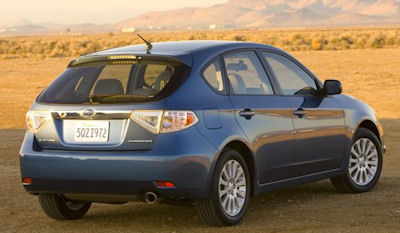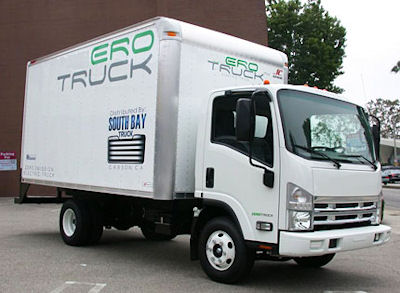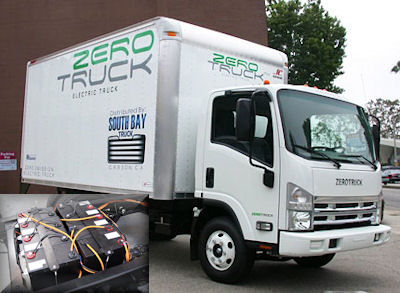Economic Inevitability
I'm all for fresh oil drilling, for getting shale up and running, for converting coal to methanol and trash to ethanol that we can burn in our flex fuel vehicles. I like the idea of diesel sourced from algae and bacteria that excretes crude oil. I'd be proud to drive around fueled by used french-fry grease, and I think converting atmospheric CO2 into gasoline is a swell idea.
Those are all great ideas and I think we should pursue each and every one of them enthusiastically. But I'm starting to think that the real future of automotive transportation has little if anything to do with liquid fuel (or even natural gas.) Here's why.
I drive one of these and I love it.

With my Impreza, I get between 22-32 MPG. With gas anywhere from $3.90 - $4.35 a gallon, let's just round everything off and say that I'm paying about $4 for every 25 miles I drive. That doesn't sound like such a bad deal until you consider what it ought to cost to drive something that looks like this:

Take one of these Ero trucks, load it up with freight, drive it 50 miles to its destintation and then 50 miles back home, how much would you expect to shell out? Keep in mind that such a trip will run you about $16 in my moderately fuel efficient Subaru. At least twice as much, right? Call it $30 at the barest minimum
Would you believe 10% of that? How does $3 sound for a 100-mile trip?
The's because our "Ero truck" is really a Zero truck, an Isuzu modified to run on expensive-to-buy-but-oh-so-inexpensive-to-operate lithium batteries. Go back and read over all those fuel options I listed at the beginning of this post. Do any of them promise to deliver 100 miles of driving for three dollars?
I didn't think so.

Electric cars are the way this thing is going to work out, folks. Yes, there are major issues to be resolved around developing more efficient batteries, extending the range these things can drive, figuring out a way to charge up quickly, etc. And of course, the biggest issue -- how do we source all that electricity?
Mr. Pickens' continent-sized wind farm is one idea. Getting serious about nuclear is another.
But it's simple economics in the end. That 13 extra bucks I'm paying for every 100 miles of driving could be better spent on -- so many things. Multiply that by the 20,000 miles I'm likely to put on my car in a year, and that's $2600. Multiply that by the five years I'm taking to pay off my car and we're looking at a break even point of an all-electric Subaru Impreza -- with a sufficient range to get me from Highlands Ranch to Boulder and back, slightly more than the 100 miles that the Zero truck delivers -- costing about $13,000 more than what I paid for mine.
Faster, please.



Comments
Here's another approach. I telework. I don't move my atoms around in a 3,000 lb block of steel w/wheels when electrons can move at the speed of light and accomplish all my work. I know not everyone can do this, but *millions upon millions* can! Today! It just takes people to look around and see it right in front of their eyes.
I commute all over the world, starting in the UK in the AM, east coast then on to California and asia. But my butt stays out of the car. So, I'd estimate that I'm getting nigh unto infinite mileage as my virtual work personna travels 10s of thousands of miles each day/every day.
I have an old car that gets 20 mgp city, 28 highway. I have avoided replacing it because I don't NEED it anymore (and yes, my wife uses her car to shop...). As a result, our gasoline use has dropped by fully 1/2. Duplicate that result across the world, and good things might happen.
I'll hold onto my cars until I 1.) need a replacement and 2.) Can get a full electric vehicle for $35k or less.
great post by the way!
Cheers,
Dave
Posted by: David Gobel | July 12, 2008 12:30 PM
PS
"That 13 extra bucks I'm paying for every 100 miles of driving could be better spent on -- so many things. "
LIke more awesome ethernet cables, for example.
Posted by: MDarling | July 14, 2008 04:53 PM
Yeah, but come on -- I'd have to drive 1000 miles to save that much!
Posted by: Phil Bowermaster | July 15, 2008 09:48 AM
Phil,
As someone who thinks that liquid storage for energy is the smarter idea I have to say this is very impressive.
I would note that at least given current battery technology this won't work with passenger cars; The conversion adds 600 pounds: that's the equivalent of driving around you car fully loaded with passengers. Not to mention that I don't think the passenger car would have room for those batteries which 'ride between the truck's frame rails'
The real question for battery technology is my mind though is, can it meet the standard for high energy density at low weight and be quickly filled with energy?
I could believe that those two objectives are as contention with each other.
Either way, I hope in the future we have options for super efficient electric or internal combustion engines. I would hope that you could even pay $5k more when buying a new car to get the other engine in crate which you could easily plug in the car depending on what you were doing with it.
Posted by: dantealiegri | July 15, 2008 10:25 AM
Sure, the fuel is cheap, but that doesn't mean you can ignore the capital costs. They're just as real, and since they're up front they have to beat the discount rate as well as the cost of the competing fuel.
I've been looking around, and I can't find a good chart summarizing what progress has been made in batteries over the last ~20 years on a cost-adjusted basis. Any suggestions?
Posted by: Brock | July 15, 2008 12:41 PM
Brock
I could give you a few - but they are no more "true" than another. The wiki article is pretty good- but the "real" data is hard to get anyone who could know to talk or publish honestly.
Check EESTOR for an example.
Posted by: MDarling | July 18, 2008 09:06 PM